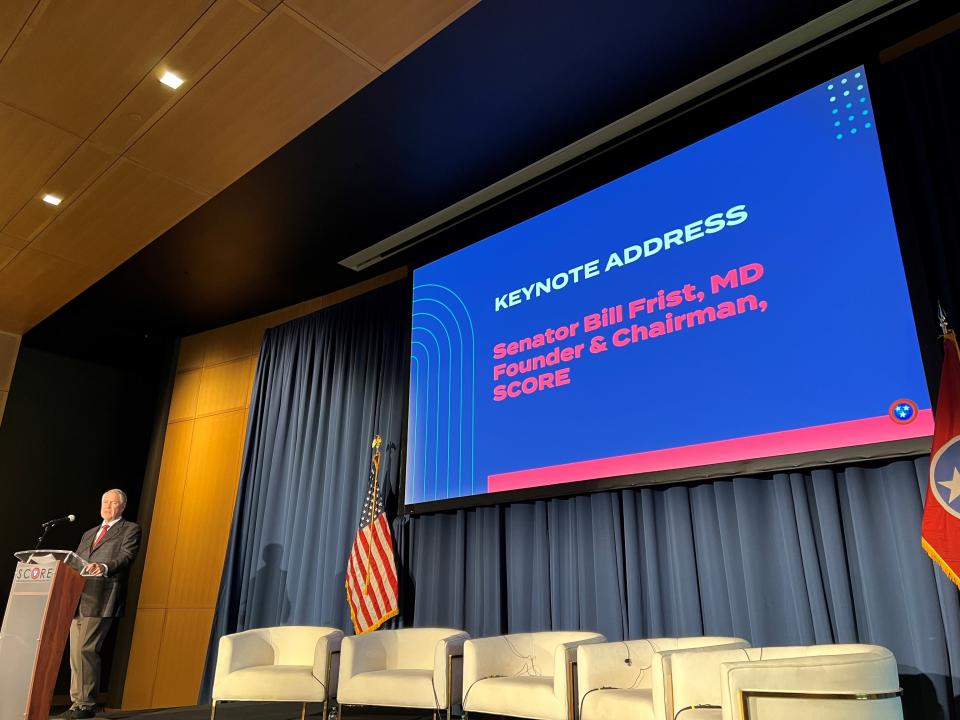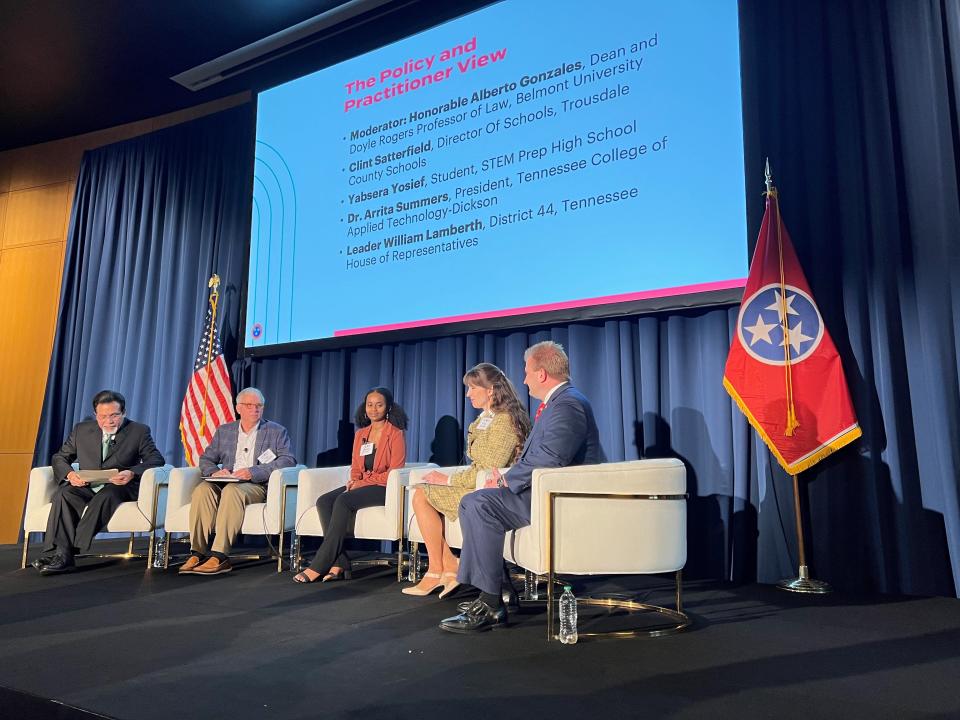Tennessee must refocus our education system to help more students succeed | Opinion
For the better part of two decades, Tennessee has been on a journey to significantly improve public education and workforce opportunities for all Tennesseans.
And by working together, we have made significant progress, moving from the back of the pack to one of the most improved and innovative states in the country on multiple K-12 and higher education measures.
However, as we emerge from the global pandemic and head into 2023, it is clear we still have much more work to do if we are to build a strong bridge between our education and workforce systems and truly create a lifetime of opportunity for all Tennesseans.
Education opens doors to economic independence, and we must rally around the goal of ensuring our students are part of the best-prepared and best-educated workforce in the nation.
Tennessee’s workforce needs are expanding
Our strong business climate and game-changing education reforms have contributed to a strong economy where opportunities abound. However, there is increasing concern about whether the state’s workforce will have the capacity to sustain this boom.

Employers are currently seeking to fill nearly 400,000 job openings in our state, and at least 60% of those jobs require training or education beyond high school. Yet, fewer than 40% of students are leaving high school prepared for postsecondary education, and only 48% are completing any kind of education beyond a high school diploma.
This has the potential to create a shortage of qualified employees in our state’s workforce, particularly as our economy continues to grow.
In addition, like so many other states, Tennessee experienced an unprecedented education crisis during the COVID-19 pandemic. We saw significant learning loss in K-12 education and a dramatic decline in the number of high school graduates going to college, especially among economically disadvantaged students and students of color.
Hear more Tennessee Voices: Get the weekly opinion newsletter for insightful and thought provoking columns.
Our education system must meet those needs
Given these opportunities and challenges, SCORE, Tennessee’s State Collaborative on Reforming Education, is resolved that more must be done to ensure that every Tennessee student has the skills and experience needed to succeed in an increasingly competitive workforce.

On Thursday, SCORE publicly shared our annual State of Education In Tennessee Report and the organization’s 2023 policy priorities at the Tennessee State Museum in Nashville at the first of three regional events across the state. We hope educators, parents, policymakers, and community leaders will join us over the course of the next year — and beyond — as we center our advocacy and work around three primary objectives centered on expanding economic opportunity.
Advance high-quality instruction for every student
Educators have worked hard to support students and families, and we must do more to build on those efforts.

To advance high-quality instruction for every student, research-supported practices like high-dosage tutoring for the students of greatest academic needs, a continued and urgent focus on early literacy, and support for high-quality public charter schools have the most immediate potential to refocus K-12 education and close longstanding opportunity gaps between student groups.
Tennessee’s teaching workforce has also been disrupted by the pandemic. As schools and districts across the state look to hire and retain great teachers for their students, the state should offer new incentives to attract more students into teaching, while reducing the cost of becoming a teacher and creating new pathways for teacher licensure.
Address Tennessee’s college-going decline with urgency
Following the onset of the COVID-19 pandemic, Tennessee saw its college-going rate decline by 9 percentage points over a two-year period. While many students may be pursuing immediate job opportunities, this decline has long-term implications for the economic health of our state and its citizens.

To actively combat this decline, we must advance as many proven strategies as possible — like building greater awareness and support for the many full-time, part-time, and online options students have for education after high school, making financial aid opportunities more accessible, and bridging the gap between high school and higher education through summer programs that combat the “summer melt” of students that drop out between graduation and the first day of college.
Other priorities should include weaving postsecondary education and training into high schools by expanding dual enrollment programs that allow students to earn college credits, postsecondary certificates, and degrees while still in high school — and continuing to increase investments in career and technical education.
Sign up for Latino Tennessee Voices newsletter:Read compelling stories for and with the Latino community in Tennessee.
Prepare all Tennessee students for the future of work
Our state is experiencing a period of unprecedented economic growth, with hundreds of thousands of new job openings. To meet these needs, we encourage state policymakers and educators to use our state’s robust education and workforce data to drive decision-making around needed degrees and programs in both K-12 and higher education, data that is not always easily accessible to stakeholders. For example, creating public-facing dashboards that utilize education-to-workforce information can empower local leaders, parents, and educators and shine a light on important trends that can help us find ways to better support students.

In addition, it’s time to set bold workforce goals that focus on increasing postsecondary attainment and labor-force participation to address employer needs, especially in high-wage, high-demand fields.
Nearly a decade ago, Tennessee launched its innovative “Drive to 55” initiative with the goal of equipping 55% of Tennesseans with a college degree or certificate by 2025. As we reach the end of this 10-year campaign, it’s time to reshape and update this goal to align with postsecondary attainment goals that are relevant to what our workforce needs today and in the future. We need a new focus on increasing the number of Tennesseans with a high-wage, high-demand postsecondary certificate or degree.
Sign up for Black Tennessee Voices newsletter:Read compelling columns by Black writers from across Tennessee.
Let’s work together to move our state forward
These and many more ideas are included in SCORE’s State of Education In Tennessee Report and policy agenda. We hope you will take time to read and evaluate all of our recommendations.
Education is the path to economic independence, and Tennessee should aspire for its students to be among the best-prepared and best-educated workforce in the nation.
We hope you’ll join us as we commit to charting a stronger path forward for students to succeed in the classroom, in college, and in the workplace.
Bill Frist, a surgeon and former U.S. Senate majority leader, is founder and chairman of Tennessee SCORE. David Mansouri is SCORE’s president and CEO.
Report presentations in Knoxville and Memphis
SCORE will next present its report in East and West Tennessee during the week of Dec. 12. Here are the dates:
Knoxville: Tuesday, Dec. 13, 8:30 a.m. EST, University of Tennessee Howard Baker Center for Public Policy, 1640 Cumberland AvenueMemphis: Thursday, Dec. 15, 8:30 a.m. CST, National Civil Rights Museum, 450 Mulberry Street
Learn more at: https://tnscore.org/
This article originally appeared on Nashville Tennessean: Tennessee must refocus education system to help more students succeed

